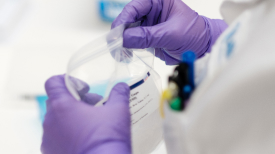- Cancer Care Team
Cancer Care Team
To deliver optimal patient outcomesProducts and Services
Cancer Type
Supplies & Tools
Scientific Focus
- Biopharma Partners
- Patients
- Education & Events
- Login
- Contact Us
Test Details
 Cancer Type
Cancer Type
Chronic myelogenous leukemia (CML), Hematologic malignancies, Leukemia
 Technology Used
Technology Used
Molecular
 Turnaround Time
Turnaround Time
10 - 14 days
Use
Point mutations within the ABL1 kinase domain of the BCR-ABL1 fusion gene frequently cause secondary resistance to tyrosine kinase inhibitor (TKI) therapy. Those patients with a longer duration of CML prior to initiation of imatinib therapy are reported to have a higher incidence of detectable mutations compared to patients with an earlier onset of imatinib therapy. In addition, failure to achieve a major cytogenetic response within the first six months of therapy often reflects the presence of a mutation or a high probability that a mutation will subsequently be detected. Biochemical and cellular assays have demonstrated that the different BCR-ABL1 kinase domain mutations result in varying levels of resistance. Presence of kinase domain mutations are associated with poor prognosis and higher risk of disease progression. The different mutations may require differing strategies to overcome resistance, such as dose escalation, combination therapy or transplantation. Candidates for the BCR-ABL1 kinase domain mutation analysis include:
• Response milestones not reached
· Any sign of loss of hematologic response
· Any sign of loss of Complete cytogenetic response (CCyR) or its molecular response correlate-defined as an increase in BCR::ABL1 transcript to >1% International scale [IS]
· 1-log increase in BCR::ABL1 transcript levels and loss of Major Molecular Response (MMR)
• Disease progression to Accelerated Phase (AP-CML) or Blast Phase (BP-CML)
This assay sequences the entire ABL1 kinase domain and will detect all mutations in ABL1 kinase recommended by guidelines including G250E, Y253H, E255K/V, V299L, T315I/A, F317L/V/I/C, A337T, F359V/I/C and P465S.
Special Instructions
Please direct any questions regarding this test to oncology customer service at 800-345-4363.
Limitations
In vitro studies indicate that this analysis has a mutation detection sensitivity of ∼20%. Mutations occurring outside of the analyzed region of the ABL kinase domain will also not be detected by this assay.
This test was developed and its performance characteristics determined by Labcorp. It has not been cleared or approved by the Food and Drug Administration.
Methodology
Polymerase chain reaction (PCR); direct sequencing; capillary electrophoresis
Specimen Requirements
Information on collection, storage, and volume
Specimen
Whole blood or bone marrow
Volume
3 to 5 mL whole blood or 1 to 2 mL bone marrow
Minimum Volume
3 mL whole blood or 1 mL bone marrow
Container
Lavender-top (EDTA) tube, green-top (sodium heparin) tube, yellow-top (ACD-A) tube, tan-top (K2-EDTA) tube or pink-top (K2-EDTA) tube
Storage Instructions
Ship at room temperature. If specimen must be stored prior to shipment, store at 2°C to 8°C.
Causes for Rejection
Specimen does not meet all of the above criteria for sample type, container, minimum volume, collection and storage; unsuitable specimens include but are not limited to: frozen whole blood or marrow; a leaking tube; clotted blood or marrow; a grossly hemolyzed specimen or otherwise visibly degraded; specimen suspected of being contaminated by another specimen; specimen contains specific foreign material
Collection
Submit at room temperature. Specimens should arrive in the laboratory within 48 hours of collection. Indicate date and time of collection on request form.
Related Tests
Find more tests related to this one.





